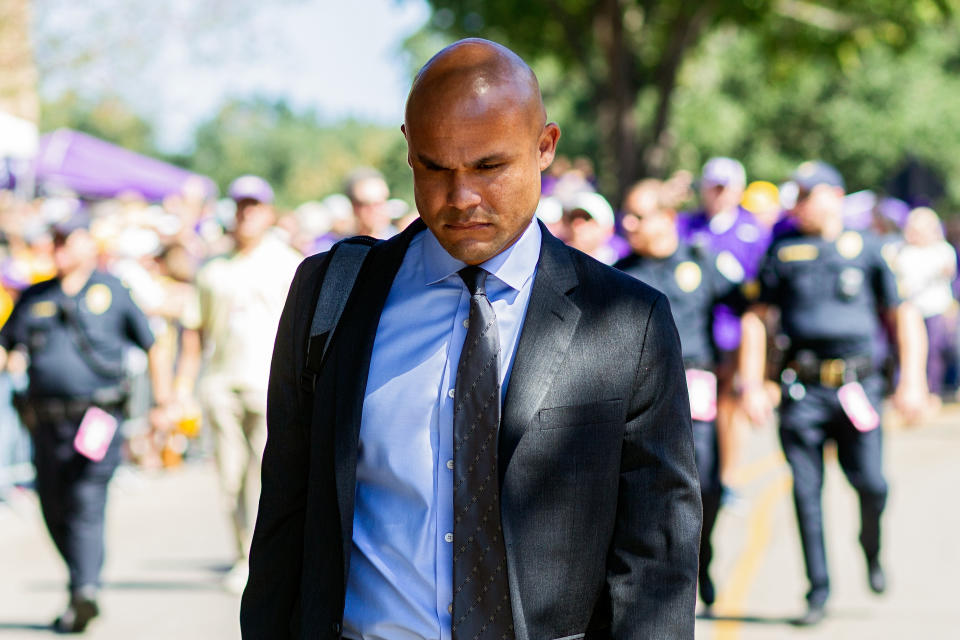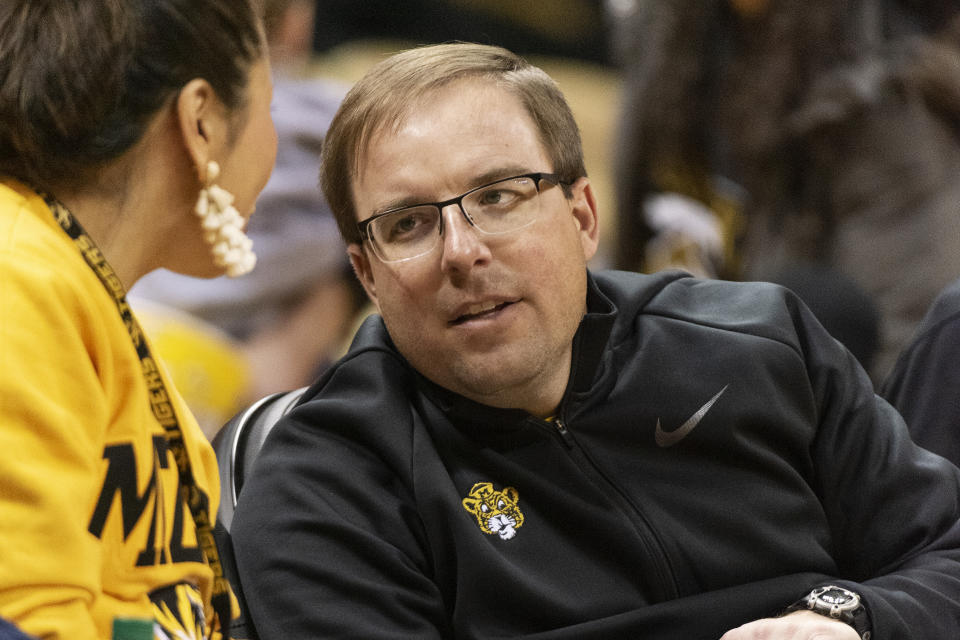First-year college football coaches facing 'extreme challenges' in wake of coronavirus pandemic
First-year Baylor coach Dave Aranda is living 450 miles from the school’s football offices in Waco, Texas. He’s waiting to move into a house there that he’s bought but never actually seen. And he’s spending his days alternating between reading philosophy, making recruiting calls and balancing work duties with his daughters’ requests for him to make TikTok videos.
Life at the Aranda house in Baton Rouge, Louisiana, unfolds like a lot of American homes these days. School starts at 8 a.m. with the three kids scattered around the house – 15-year-old Jayden in the den, 13-year-old Jordan upstairs in her room and 10-year-old Ronin in the kitchen – locked into their assorted virtual schooling.
While Aranda’s kids study, he calls his current players, works on recruiting new ones and communicates with his staff via Zoom. His wife, Dione, monitors the virtual schooling. The afternoons have been filled with Aranda toggling between his work duties and the calls to join family bike rides and basketball games.
Aranda finds himself caught between navigating a demanding new job in unprecedented times and the life he’d temporality left behind to go take it. The Aranda family stayed in Baton Rouge to finish out the school year, and their football coaching father said eight of his 10 assistant coaches have family in a city other than Waco. Aranda found a quote from his daily philosophy reading to summarize the uncertainty: “Technique is what teachers use until the real teacher arrives.”
Those spontaneous lessons are being learned around the country by first-year coaches like Aranda, dealing with the restrictions and fallout from the COVID-19 pandemic. Many are stuck in towns they’d planned on leaving, coaching a team that can’t practice and preparing for a season that may not happen. Much of their coaching is relegated to the video conferencing software Zoom, their vocation executed amid a setting that reminds them of the old Hollywood Squares gameshow.

So while college football has evolved into a virtual enterprise, the reverberations have been strongest among the coaches attempting to adjust to new environments:
• Missouri coach Eliah Drinkwitz says one of his biggest worries for his players doubles as his own: That as he orders dinner on Grubhub from Shakespeare’s Pizza, Pickleman’s Café and Slim Chickens, he can’t out-train an unhealthy diet. “I’m living proof,” he said.
• Boston College coach Jeff Hafley’s 4-year-old daughter, Hope, slides her daily arts and crafts project under his office door with hopes he’ll hang them on his office wall. The Hafleys have installed a bounce house in their basement, which Hope and 1-year-old Leah use during their dad’s breaks.
• Old Dominion coach Ricky Rahne has been moonlighting as both the history and music teacher for his sons, Ryder (10) and Jake (8), giving lessons in everything from the Nevada gold rush to Buddy Holly.
• UTSA coach Jeff Traylor jokes that he and his wife of 28 years, Cari, are empty nesters who suddenly have a full house with their three kids under one roof with the occasional competing zoom call.
• Colorado State coach Steve Addazio is running his program from his vacation home in Cape Cod, Massachusetts, after selling his home near Boston. While moving trucks have shipped the Addazio’s belongings to Colorado, it’s unknown when he and his wife, Kathy, will be able to arrive and use them.
All those first-year coaches are also living proof of this new normal, tackling new jobs and adjusting to new lives while being housebound for perhaps the first time in their respective careers. “It’s like the ‘Hunger Games’ a little bit just going to the Safeway,” Aranda jokes.
Finding an identity: ‘It’s going to be one shot, one kill’
The conversation with Aranda bandied from bible passages to Battleship, his favorite board game that he jokes his kids aren’t too keen on playing with him. But it ends up at football, which is going to be complicated as Baylor didn’t have a single spring practice before the school shut down athletic activity.
There’s been very little carryover from former coach Matt Rhule’s staff to Aranda’s. The new offensive coordinator, Larry Fedora, will bring a fresh system, and the defensive system of Aranda and coordinator Ron Roberts will require an overhaul. While there’s some optimism that there could be extra practices in the summer if a return to normal happens quickly, it’s already certain there will be a sprint to prepare for the season.
So what will Baylor look like from a fundamental football standpoint?
“It’s going to be, just the facts, man,” Aranda said. “The mindset changes when you don’t have the practices. We’ll be clear on an identity. This is who we are. This is what we do. It’s not going to be, ‘Try this,’ or ‘Look at this.’ It’s going to be one shot, one kill.”
Aranda hinted that football this fall could end up being less sophisticated and a bit sloppy. He said teams that can execute the simple things – get calls in on offense, communicate checks on defense and snap cleanly – are going to thrive with offseason reps limited.
At LSU, where he served as defensive coordinator the past four seasons, Aranda said they’d install a bevy of calls for blitzes in the spring – Install 3, Tight 4, Romo 4 and Bradshaw 4. That will be streamlined due to lack of opportunity. “It’ll be the quality of what we know,” Aranda said. “Not the quantity.”
Drinkwitz was planning to take the field for Missouri’s fourth spring practice when football activities were shut down. He’s ahead of Aranda logistically since his wife and four daughters – ages 5 months to 9 years old – have already moved into their home in Columbia. But watching “Frozen 2” on repeat and making chocolate chip cookies isn’t going to help win SEC games.
So he agrees with Aranda’s general philosophy that teams are going to have to major in majors, meaning stick to what they do well. When asked which hurts more, the missed practices or the time to bond with players that the staff hardly knows, Drinkwitz chuckled. “I think that’s like asking whether you amputate your arm or leg,” he said.
Drinkwitz will be bringing a new offensive system, breaking in a new starting quarterback and will have to do it with little practice time. Drinkwitz is a believer that reps leads to mastery in football, and that element will be missing. “Watching it is not the same as doing it,” Drinkwitz said.
It’s difficult to carve an identity for a team when you’ve yet to identify the strengths. “How do you know who to build the offense around?” he asked. “Who is the playmaker? Who is the offensive lineman you run behind on third-and-short? It’s oversimplifying it to say, ‘We’ll be simple.’ What are the strengths and weaknesses of the team? That’s what’s missing.”

Facing unique, ‘extreme’ challenges
ODU coach Ricky Rahne is back at his old house in State College, Pennsylvania, where his family had remained while he started his first head coaching job in Virginia. The Rahnes are “hopefully” closing on a house this week in the Norfolk area, but until then they are abiding by the meticulous school schedule put together by his wife, Jennifer, who has an engineering degree from Cornell.
When school ends, the family retreats to the basement, where Rahne plays hockey and basketball with the sons he calls “rambunctious from central casting.” For family bonding, the Rahnes play a four-player version of the Diablo III video game and the card game cribbage.
Missing spring practice isn’t as much of a challenge for a place like Penn State, Rahne said of the school where he served as offensive coordinator, because of the reservoir of continuity built under James Franklin headed into his seventh season. ODU, meanwhile, will be installing an entirely new offense and defense under coordinators Kirk Campbell and Blake Seiler.
“It’s one thing to do it on the board and another when they have to make split-second decisions,” Rahne said. “If it was about the board, I’d be a great player. But I’m not. We need these guys to be able to do things on the field.”
Rahne’s team didn’t get in any spring practices, as he’d arranged the calendar to put the practices later. That allowed them to get in concentrated time in the weight room to help change the team physically.
First-year Florida State coach Mike Norvell got three practices in, and he’s as worried about his team’s physically as he is with football schematics.
Norvell said the FSU roster has transformed itself with 695 pounds of weight gain/loss, the momentum of which will inevitably quell as players lack the access to workout equipment and, in some cases, proper nutrition.
“We made great strides over the last two-and-a-half months, just a drastic change to how we’re going to operate,” Norvell said. “Not to be side-by-side or face-to-face and in person with our team, it creates some extreme challenges.”
Hafley has tried to keep things as normal as possible for the Boston College staff, as he says that they’re operating “as if we’re all in the office.” That means 8 a.m. staff meetings over Zoom, virtual meetings with players and Hafley jumping in and out of those position meetings as if he’s walking the halls of the Yawkey Center.
The staff watches recruiting film together virtually, the same as they would in the office. “This is a different level of being organized,” Hafley said. “If we can coach in these circumstances, we’ll be much better football coaches because of it.”
‘That’s the secret sauce’
For Aranda’s first season at Baylor, he’s hoping that by missing the daily cycle of practice, meetings, walkthroughs, film reviews and tutoring, there is a chance for even greater connection. He’s spent much more time individually with his players, albeit it on the phone, than he would have in a spring practice setting. He considers that a silver lining in all this.
“The opportunity for authentic fellowship and connection,” he said. “It’s funny that you have to be a million miles apart and on Zoom to get that connection.”
In this strange era of what Aranda refers to as “the real teacher,” new techniques are abound. And Aranda has been eager to learn and embrace the new circumstance.
“When things do slow down, you’re reintroduced to yourself,” he said. “The best coaches coach who they are. To fully know what makes you tick and drives you. That’s the secret sauce. Embrace it and let it be known to your players.”
More from Yahoo Sports:

 Yahoo News
Yahoo News 